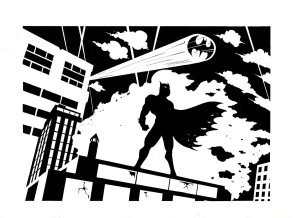The Virtue of Vigilantismby Logan AlbrightNov. 01, 2013 |
Popular 
The OJ Simpson Case for a New Generation

Tim Pool Confirms Meeting With Netanyahu to Discuss 'Anti-Semitism' in Pro-Trump Spaces

Trump Names Israeli-Born Yehuda Kaploun as U.S. Anti-Semitism Czar

Trump Exempts Smartphones, Computers and Other Electronics from Tariffs

DHS to Begin Monitoring Immigrants' Social Media for 'Anti-Semitism'
  Most of us are brought up believing that we live in a nation of laws, that certain objective rules govern society, and that enforcing those rules is the sole province of government and its agents. When we have a problem, we rely on the police and the courts to solve it, and whatever decisions they make are deemed final and binding. Horror stories about lynchings and mob justice instill an inherent fear of taking the law into our own hands. Leave it to the professionals, we are told. They will take care of us. Most of us are brought up believing that we live in a nation of laws, that certain objective rules govern society, and that enforcing those rules is the sole province of government and its agents. When we have a problem, we rely on the police and the courts to solve it, and whatever decisions they make are deemed final and binding. Horror stories about lynchings and mob justice instill an inherent fear of taking the law into our own hands. Leave it to the professionals, we are told. They will take care of us.On the other hand, our culture cultivates a certain admiration for the lone vigilante, the solitary do-gooder who is mad as hell and unwilling to take it anymore. Superhero comics, now supplanted by blockbuster films grossing hundreds of millions of dollars, extravagantly celebrate the individual doing what the system cannot. We long to see justice served, and nothing frustrates more than a legal framework that provides loopholes for the bad guys to escape their just deserts. The drawback of a single, monolithic legal system such as the one we are used to is that laws become necessarily complex and difficult to navigate. Bad guys slip through the cracks, and justice is not always served as we would like it to be. As John Hasnas reminds us in his magnificent essay, The Myth of the Rule of Law, the legal system is not based on facts, but rather on interpretations and precedent. Indeed, any justice system must necessarily have these flaws, which is why a healthy dose of vigilantism is often so refreshing. Take the case of Franco Scaramuzza, a Tennessee fencing coach who, upon witnessing an attack in progress, whipped out his épée and meted out justice the old-fashioned way. Despite the fact that the épée is manifestly the weakest of the three fencing weapons (no right-of-way rules? Come on!), Scaramuzza should be praised for his bravery and initiative in this case. Had he not intervened, who knows when and if the designated authorities would have arrived to do their duty. As citizens, we should all be more vigilant in correcting injustice. Having delegated the authority of law enforcement to a government body, we have, in too many cases, abdicated our responsibilities as members of our communities. I have written before about the effectiveness of public censure and community justice as a means of enforcing behavioral norms, but with the increasing strength of the state, such communal law enforcement has largely disappeared, much to society's detriment. I say largely, but not entirely, as little islands of community justice still crop up in the unlikeliest of places: the internet. Strangely, the sorts of relationships cultivated over online message boards and forums are often stronger and more durable than real world interactions these days, and such communities do not tolerate mistreatment of their own, or the perceived abuse of those who cannot defend themselves. Online humor site Cracked has compiled an inspiring and hilarious list of cases in which internet communities rose up to correct wrongdoing where the so-called proper authorities were unable or unwilling to assist. Do some of these cases come dangerously close to mob bullying? Perhaps, and it is of course important to remain watchful lest the majority simply exercise its might as a way to oppress the minority. We certainly do not want a new era of lynchings. However, the individual initiative to correct wrong when you see it is, I think, a good instinct and one which should not be too rashly suppressed in the name of preserving the state's monopoly on force. After all, if we are not willing to help our neighbors and punish those who would harm them, we contradict our own ideology and lend credence to the idea of the state as our necessary and legitimate protector and, in some cases, jailer. _ Logan Albright is a writer and economist in Washington, DC. |



